
HOME
INTRO
SYMBOLS
ALMANAC
ECONOMY
GEOGRAPHY
STATE MAPS
PEOPLE
FORUM
NEWS
COOL SCHOOLS
STATE QUIZ
STATE LINKS
BOOK STORE
MARKETPLACE
GUESTBOOK
CONTACT US


Andrew Jackson (1767-1845)
In Article II, Section 1 of the Constitution of the United States of America, the following requirements are stipulated for those wishing to hold the office of the President of the United States.
No person except a natural born Citizen, or a Citizen of the United States, at the time of the Adoption of this Constitution, shall be eligible to the Office of President; neither shall any Person be eligible to that Office who shall not have attained to the Age of thirty-five Years, and been fourteen Years a Resident within the United States.
7th President of the United States (1829-1837)
More nearly than any of his predecessors, Andrew Jackson was elected by popular vote; as President he sought to act as the direct representative of the common man.
Born in a backwoods settlement in the Carolinas in 1767, he received sporadic education. But in his late teens he read law for about two years, and he became an outstanding young lawyer in Tennessee. Fiercely jealous of his honor, he engaged in brawls, and in a duel killed a man who cast an unjustified slur on his wife Rachel.
Jackson prospered sufficiently to buy slaves and to build a mansion, the Hermitage, near Nashville. He was the first man elected from Tennessee to the House of Representatives, and he served briefly in the Senate. A major general in the War of 1812, Jackson became a national hero when he defeated the British at New Orleans.
| Andrew Jackson: | |
|---|---|
| Source: University of Virginia, Miller Center of Public Affairs, www.millercenter.virginia.edu, March 11, 2008. | |
| 7th President of the United States | |
| Born: | March 15, 1767 in Waxhaw area, on North Carolina-South Carolina border. |
| Nickname: | "Old Hickory" |
| Education: | Sporadic, Read law for two years in late teens |
| Religion: | Presbyterian |
| Marriage: | August 1791 (2nd ceremony, January 17, 1794), to Rachel Donelson Robards (1767-1828) |
| Children: | None. |
| Career: | Lawyer, Soldier |
| Political Party: | Democrat |
| President: | Two terms (8 years) from 1829-1837. |
| Age at inauguration: | 61 |
| Died: | June 8, 1845 in Nashville, Tennessee. |
| Interred: | The Hermitage,Nashville, Tennessee. |
In 1824 some state political factions rallied around Jackson; by 1828 enough had joined "Old Hickory" to win numerous state elections and control of the Federal administration in Washington.
In his first Annual Message to Congress, Jackson recommended eliminating the Electoral College. He also tried to democratize Federal officeholding. Already state machines were being built on patronage, and a New York Senator openly proclaimed "that to the victors belong the spoils. . . . "
Jackson took a milder view. Decrying officeholders who seemed to enjoy life tenure, he believed Government duties could be "so plain and simple" that offices should rotate among deserving applicants.
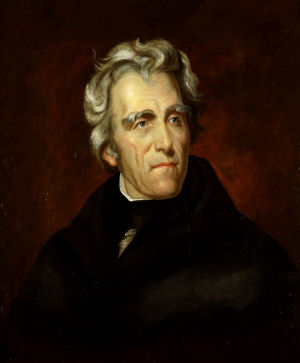
Andrew Jackson attributed to Thomas Sully (1857 ca.)
Source: United States Senate
As national politics polarized around Jackson and his opposition, two parties grew out of the old Republican Party--the Democratic Republicans, or Democrats, adhering to Jackson; and the National Republicans, or Whigs, opposing him.
Henry Clay, Daniel Webster, and other Whig leaders proclaimed themselves defenders of popular liberties against the usurpation of Jackson. Hostile cartoonists portrayed him as King Andrew I.
Behind their accusations lay the fact that Jackson, unlike previous Presidents, did not defer to Congress in policy-making but used his power of the veto and his party leadership to assume command.
The greatest party battle centered around the Second Bank of the United States, a private corporation but virtually a Government-sponsored monopoly. When Jackson appeared hostile toward it, the Bank threw its power against him.
Clay and Webster, who had acted as attorneys for the Bank, led the fight for its recharter in Congress. "The bank," Jackson told Martin Van Buren, "is trying to kill me, but I will kill it!" Jackson, in vetoing the recharter bill, charged the Bank with undue economic privilege.
His views won approval from the American electorate; in 1832 he polled more than 56 percent of the popular vote and almost five times as many electoral votes as Clay.
Jackson met head-on the challenge of John C. Calhoun, leader of forces trying to rid themselves of a high protective tariff.
When South Carolina undertook to nullify the tariff, Jackson ordered armed forces to Charleston and privately threatened to hang Calhoun. Violence seemed imminent until Clay negotiated a compromise: tariffs were lowered and South Carolina dropped nullification.
In January of 1832, while the President was dining with friends at the White House, someone whispered to him that the Senate had rejected the nomination of Martin Van Buren as Minister to England. Jackson jumped to his feet and exclaimed, "By the Eternal! I'll smash them!" So he did. His favorite, Van Buren, became Vice President, and succeeded to the Presidency when "Old Hickory" retired to the Hermitage, where he died in June 1845.
Source: The White House: Presidents, Andrew Jackson 23 November 2009 <www.WhiteHouse.gov>.
Presidential $1.00 coin:
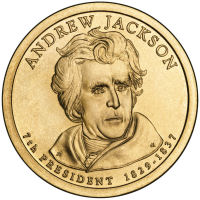
U.S. Mint Image
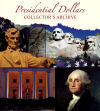
Presidential Dollars
Collector's Archive
A citizen of Tennessee, Andrew Jackson was the first president elected from west of the Appalachian Mountains. As a boy, he fought in the Revolutionary War. Jackson gained national prominence as a hero of the War of 1812, and was nicknamed "Old Hickory" for his firm discipline as commander of his troops.
As president, Jackson worked to strengthen the executive branch and vetoed more bills than the six prior presidents combined. His renomination to a second term marked the first use of a national nominating convention to select a party's candidate instead of a congressional caucus.
A strong proponent of federal supremacy over states' rights, he took a forceful stance against the state of South Carolina's attempt to nullify a federal tariff, declaring "Our federal Union: it must be preserved."
President Jackson authorized three southern branches of the United States Mint in 1835 -- New Orleans, Charlotte, and Dahlonega.
Coinage Legislation under President Andrew Jackson
Act of June 25, 1834 -- This Act regulated the legal-tender value of certain foreign silver coins.
-- This Act regulated the legal-tender value of certain foreign silver coins.
Act of June 28, 1834 -- This Act regulated the legal-tender value of certain foreign gold coins.
-- This Act regulated the legal-tender value of certain foreign gold coins.
Act of June 28, 1834 -- This Act set the standard weight of U.S. gold coins, set the standard for payment for gold or silver deposited for coinage, set the rate at which gold coins shall be receivable, and directed the setting apart of gold coins for assay.
-- This Act set the standard weight of U.S. gold coins, set the standard for payment for gold or silver deposited for coinage, set the rate at which gold coins shall be receivable, and directed the setting apart of gold coins for assay.
Act of March 3, 1835 -- This Act established a branch of the United States Mint for the coinage of silver and gold at New Orleans, Louisiana, and branches for the coinage of gold at Charlotte, North Carolina and Dahlonega, Georgia.
-- This Act established a branch of the United States Mint for the coinage of silver and gold at New Orleans, Louisiana, and branches for the coinage of gold at Charlotte, North Carolina and Dahlonega, Georgia.
Act of January 18, 1837 -- This Act:
-- This Act:
- set forth the duties and increased the salaries of the officers of the United States Mint, with the Director earning $3,500 per year including travel expenses;
- set forth the composition and weight of gold and silver coins;
- mandated that each coin struck at the United States Mint shall have on one side an impression emblematic of liberty with an inscription of the word "Liberty" and the year of the coinage; and that the reverse of gold and silver coins shall have the representation of an eagle with the inscription "United States of America." The figure of the eagle shall be omitted from the reverse of the dime, half dime, cent, and half cent;
- made provisions for gold and silver bullion that is brought to the Mint for coinage.
United States Mint Directors appointed by President Jackson
- 1835: Robert Maskell Patterson, M.D -- Sixth Director of the United States Mint.
Source: The United States Mint: Presidential $1 Coins, Andrew Jackson 24 November 2009 <www.usmint.gov>.
Presidential state dollars: Information about design of the Presidential $1 Coins.
Presidential $1 Coins: Release information regarding the Official U.S. Mint Presidential $1 Coins.
Additional Information
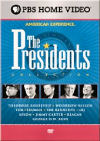
The Presidents
Collection DVD
United States Presidents: List of all United States Presidents from NETSTATE.COM.
Andrew Jackson 1767-1845 Biography from the The Tennessee Encyclopedia of History and Culture from the Tennessee Historical Society, Nashville.
Senator Andrew Jackson (1797-1798, 1823-1825) Biographical information from the Biographical Directory of the United States Congress.
Andrew Jackson America's Story from America's Library, the Library of Congress.
American Presidents: Life Portraits A Site to Complement C-SPAN's 20th Anniversary Television Series, American Presidents: Life Portraits.
Andrew Jackson (1767 - 1845) American President: An Online Reference Resource from the Miller Center of Public Affairs, University of Virginia. In-depth information reviewed by prominent scholars on each President and administration.
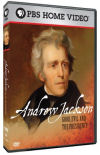
Andrew Jackson DVD
Good, Evil and the
American Presidency
Andrew Jackson: A Life Companion site the Public Broadcasting Service Series -- The quintessential self-made man, Andrew Jackson, the son of poor Irish immigrants, rose from his humble background to become a national military icon and the 7th President of the United States. During his terms as president, Jackson confronted some of the defining issues facing a nascent nation still searching for its identity. By moving beyond the politics and ideologies set in place by the Founding Fathers, Andrew Jackson became one of the most striking, polarizing, and influential figures in American history.
Andrew Jackson Public Broadcasting's American Experience: The Presidents.
Presidential Inaugurations: Andrew Jackson Presidential Inaugurations is presented by the Library of Congress, and other governmental departments, in collaboration with the Avalon Project at the Yale Law School. This presentation includes diaries and letters of presidents and of those who witnessed inaugurations, handwritten drafts of inaugural addresses, broadsides, inaugural tickets and programs, prints, photographs, and sheet music.
Andrew Jackson's Hermitage, Nashville, Tennessee The Hermitage mansion has been meticulously restored to its 1837 appearance and today looks much as it did when Andrew Jackson returned to it after finishing his second term as President. After the home was damaged by fire in 1834, Jackson had it remodeled in the Greek Revival style. Today, six wallpapers installed after the fire still hang on the walls and the majority of the furniture in the home was purchased by the Jackson family to replace pieces damaged in the fire. Personal objects, like Jackson's swords and books, also adorn the home along with the Jackson family's collection of portraits.
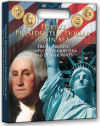
Deluxe Presidential
Dollar Coin
Traveling Archive
Deluxe Presidential Dollar Coin - Traveling Archive , Whitman Publishing (August 7, 2007) Lift off the capsule top, insert the coin, and snap it shut. Now your Presidential dollar is securely stored and attractively displayed - you can even see the coins's edge, which includes the date, mintmark, and inscriptions. Space for both Philadelphia and Denver Mint Coins. Includes Presidential facts printed on the inside flaps. Holds 80 coins - makes a great display and storage unit. (13.375" x 11.5" x 1.0").

Presidential Dollars
Collector's Archive
Presidential Dollars Collector's Archive, Whitman Publishing (August 7, 2007) In December 2005, Congress approved the creation of a new dollar coinage, known as Presidential dollars, and President George W. Bush signed the legislation into law shortly afterward. During each year from 2007 to 2016, four different dollar designs, each bearing the image of a different president, are being released. Living presidents, both current and former, are excluded from the program--thus the roster of presidential honorees currently stands at 37. For these presidents, 38 coins are planned; this is because Grover Cleveland, who to date is the only president to serve multiple nonconsecutive terms, will be represented with two coins. The Presidential dollars are part of the Golden Dollar Program and retain the same golden color as the Sacagawea dollars. The motto IN GOD WE TRUST appears in edge lettering--a first for a U.S. coin, as the motto has never before appeared on the rim. The year of issue is likewise on the rim. Archive Size 11.25" x 10". 40 Openings.
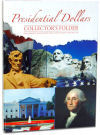
Presidential Folder
Volume I
Presidential Folder 4 Panel - Volume I and Vol II, Whitman Publishing; 1st edition (April 10, 2007) Presidential Folder 4 Panel - Volume I & II Hold P&D Mint Marks. Folder Size 7" x 9,5". Each Volume has 44 Openings - 4 Panels.
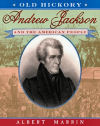
Old Hickory
Albert Marrin
Old Hickory: Andrew Jackson and the American People, by Albert Marrin. 240 pages. Publisher: Dutton Juvenile; 1 edition (December 27, 2004) Reading level: Ages 10+. From a childhood steeped in poverty, violence, and patriotic pride, Andrew Jackson rose to the heights of celebrity and power. The first popularly elected president, he won admiration by fighting corruption, championing the common man, shaping the power of the executive office, and preserving the fragile union of the young United States. Yet Jackson's ruthless pursuit of what he believed to be "progress" left indelible stains on the nation's conscience: broken treaties and the Trail of Tears are among Old Hickory's darker legacies.
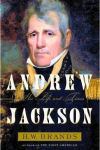
Andrew Jackson
His Life and Times
H.W. Brands
Andrew Jackson: His Life and Times, by H.W. Brands. 640 pages. Publisher: Doubleday; First Edition, 1st Printing edition (October 4, 2005) The most famous American of his time, Andrew Jackson is a seminal figure in American history. The first "common man" o rise to the presidency, Jackson embodied the spirit and the vision of the emerging American nation; the term "Jacksonian democracy" is embedded in our national lexicon.
Brands follows Andrew Jackson from his days as rebellious youth, risking execution to free the Carolinas of the British during the Revolutionary War, to his years as a young lawyer and congressman from the newly settled frontier state of Tennessee. As general of the Tennessee militia, he put down a massive Indian uprising in the South, securing the safety of American settlers, and his famous rout of the British at the Battle of New Orleans during the War of 1812 made him a national hero.
But it is Jackson's contributions as president that won him a place in the pantheon of America's greatest leaders. A man of the people, without formal education or the family lineage of the Founding Fathers, he sought as president to make the country a genuine democracy, governed by and for the people.
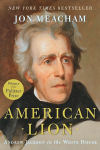
American Lion
Jon Meacham
American Lion: Andrew Jackson in the White House, by Jon Meacham. 512 pages. Publisher: Random House; First Edition edition (November 11, 2008) Andrew Jackson, his intimate circle of friends, and his tumultuous times are at the heart of this remarkable book about the man who rose from nothing to create the modern presidency. Beloved and hated, venerated and reviled, Andrew Jackson was an orphan who fought his way to the pinnacle of power, bending the nation to his will in the cause of democracy. Jackson's election in 1828 ushered in a new and lasting era in which the people, not distant elites, were the guiding force in American politics. Democracy made its stand in the Jackson years, and he gave voice to the hopes and the fears of a restless, changing nation facing challenging times at home and threats abroad. To tell the saga of Jackson's presidency, acclaimed author Jon Meacham goes inside the Jackson White House. Drawing on newly discovered family letters and papers, he details the human drama--the family, the women, and the inner circle of advisers--that shaped Jackson's private world through years of storm and victory.
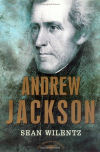
Andrew Jackson
Sean Wilentz
Andrew Jackson (The American Presidents), by Sean Wilentz. 195 pages. Publisher: Times Books - Henry Holt and Company; BCE edition (December 27, 2005) The Founding Fathers espoused a republican government, but they were distrustful of the common people, having designed a constitutional system that would temper popular passions. But as the revolutionary generation passed from the scene in the 1820s, a new movement, based on the principle of broader democracy, gathered force and united behind Andrew Jackson, the charismatic general who had defeated the British at New Orleans and who embodied the hopes of ordinary Americans. Raising his voice against the artificial inequalities fostered by birth, station, monied power, and political privilege, Jackson brought American politics into a new age. Sean Wilentz, one of America's leading historians of the nineteenth century, recounts the fiery career of this larger-than-life figure, a man whose high ideals were matched in equal measure by his failures and moral blind spots, a man who is remembered for the accomplishments of his eight years in office and for the bitter enemies he made. It was in Jackson's time that the great conflicts of American politics--urban versus rural, federal versus state, free versus slave--crystallized, and Jackson was not shy about taking a vigorous stand. It was under Jackson that modern American politics began, and his legacy continues to inform our debates to the present day.



